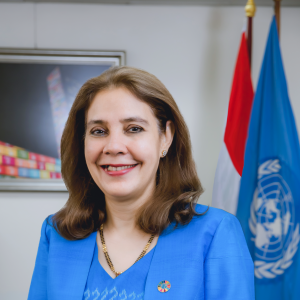It’s an honour to moderate this high-level session with policymakers to discuss accelerating productive employment and expanding social protection to speed up progress on the SDGs.
Today’s discussion is both urgent and necessary.
Indonesia, Vietnam and Pakistan are three Global Accelerator pathfinder countries who can lead by example on this critical agenda.
In all three countries the informal economy is a big contributor to economic growth and governments are working to fortify social protection and upskill the workforce to future-proof sustainable economies.
Indonesia is specifically focused on strengthening the social economic registry to enhance targeting and delivery of social protection, especially to those most at risk.
Vietnam is assessing skills gaps in the renewable energy sector with a focus on young people and women as part of the green transformation.
Pakistan is an early-stage pathfinder country working towards reducing the fragmentation of social protection, which is crucial as a million young people are entering the labour force each year, most of them in the informal
economy.
All these transformations are taking place against a backdrop of fiscally constrained governments.
Demographic shifts add another layer of urgency. Even as we are profiting from a youth bulge we are also facing an ageing population.
This makes efficiency gains in employment critical.
As part of this, upskilling and reskilling will enable young workers to thrive in their chosen professions.
At the same time we will need to expand access to social protection.
A particular focus will need to be on women, whose participation in the labour market remains unequal, limiting their economic inclusion.
This means further public investments will be necessary.
Indonesia and Vietnam will need to scale up investments in innovative financing mechanisms to bridge funding gaps for social protection and skills building to unlock the full potential of dynamic workforces.
This should include leveraging capital markets and industry.
Pakistan and Indonesia can also leverage Islamic financing, including green sukuks as well as zakat and Waqf funds.
For example, in Indonesia the UN leveraged nearly $14 million to ensure better education, nutrition, sanitation and hygiene for households across two provinces.
Just as important is social dialogue bringing together workers, businesses, policymakers and shareholders towards inclusive solutions.
Only when governments, businesses, and workers come together can we build resilient economies, bolster social protection and develop human capital.
As the RC in Indonesia, I would like to share five key learnings that are emerging applicable to most countries in transition. The government will also be speaking to them today.
One, as economies transition, targeted social protection policies are needed to mainstream workers into formal employment.
Two, combining non-contributory and contributory social protection schemes will be transformative by securing big efficiency gains to ensure that the bottom 40% of workers don’t slip through the cracks.
Three, leveraging private sector led industrial parks for skills development, vocational training and apprenticeships will help future-proof the workforce.
Four, countries will need to integrate sustainable financing instruments, including SDG bonds and Islamic social financing into their national strategies for long term sustainability.
Five, engaging the private sector is key for encouraging businesses to mainstream human rights and labour standards into ESG principles while promoting dialogues to ensure workers’ voices are heard.
Today’s discussion is an opportunity for us to learn from each other, share best practices, and chart a path toward stronger, more inclusive economies in Indonesia, Vietnam and Pakistan.
Let me invite the 3 speakers to tell us where their nations are with the Global Accelerator roadmap, what their priorities are and what strategic policy approaches they are taking.
From Pakistan, we have Ms Kanwal Batool, Deputy Secretary, Ministry of Overseas Pakistanis and Human Resource Development.
From Indonesia, we will hear from Ibu Tirta Sutedjo, Director, Poverty Alleviation and Community Empowerment, Ministry of National Development Planning,
From Vietnam, we have Ms Chu Thi Lan, Head of Division of Labour and Employment, from the Ministry of Home Affairs.
Each speaker will have five minutes to present the big picture on their roadmap, priorities and policy approaches for social protection and skills building. This will be followed by two rounds of question and answers.




